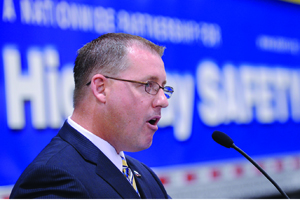Senior Reporter
Keppler Departs as Executive Director of CVSA to Take Senior Position With Intermodal Group

Stephen Keppler, executive director of the Commercial Vehicle Safety Alliance, has left the commercial enforcement group after 15 years to assume the newly created position as senior vice president of the Intermodal Association of North America.
“I’m sad to be leaving. I’ve spent a good chunk of my career here. It’s a great organization,” Keppler told Transport Topics. “But this is an opportunity that I couldn’t pass up.”
Keppler’s last day at CVSA was Sept. 4, according to an Aug. 27 statement by CVSA President Bill Reese.
“I think I can safely speak on behalf of everyone who has worked with him over the years that Steve has been a consummate advocate for commercial vehicle safety and is truly committed to making our roads a safer place to travel,” said Reese, a major in the Idaho State Police Department. “CVSA is a better and stronger alliance due to Steve’s time at the helm of the organization.”
Keppler has been executive director since 2009.
CVSA Deputy Executive Director Collin Mooney will serve as acting executive director until Keppler’s position is filled. Mooney has been with CVSA since 2003.
Even before Mooney took the helm, he learned that one of his first high-profile acts would be to orchestrate law enforcement’s brake-system inspections on trucks and buses throughout North America, designed to identify out-of-adjustment brakes and brake-system violations.
The inspections are part of CVSA’s and the Federal Motor Carrier Safety Administration’s “Brake Safety Week,” which is Sept. 6-12.
Reese said that Keppler has enhanced CVSA’s credibility and brand, increasing fiscal stability and transparency as well as member engagement and conference attendance. He added that Keppler spearheaded many policy, regulatory and legislative advancements, raised quality and quantity of educational products in digital form and helped develop a new strategic plan.
Prior to joining CVSA, Keppler was department director for vehicle systems at the Intelligent Transportation Society of America. Before that, he held various positions at the Federal Highway Administration Office of Motor Carriers — predecessor to FMCSA.
He holds two bachelor’s degrees from Drexel University in civil engineering and architectural engineering.
Keppler said his new job will be tantamount to the No. 2 post at IANA. “Essentially, I’ll be the [chief operating officer],” he said, in charge of operations, meetings, conferences, member services and publications.
“It expands my portfolio beyond safety and beyond just commercial vehicles, into rail, water and logistics,” he said. “It will allow me to be involved in a larger aspect of freight transportation.”
Keppler said CVSA already has formed a search team and will immediately begin accepting applications for his replacement.
“IANA is lucky to be adding a person of Steve’s caliber to the association staff,” IANA President Joni Casey said. “His wealth of knowledge, expertise and standing in the freight community will be put to good use on behalf of IANA’s membership, starting at the Intermodal Expo [Sept. 20-22].”
During Brake Safety Week, inspectors will be looking for improperly installed or poorly maintained brake systems that can reduce the braking capacity and stopping distance of trucks and buses, which poses a serious risk to drivers and public safety, according to CVSA.
Brake-related violations constituted 46.2% of all out-of-service violations cited during Roadcheck 2014.
Brake inspections conducted during Brake Safety Week include inspection of brake-system components to identify loose or missing parts, air or hydraulic fluid leaks, worn linings, pads, drums or rotors and other faulty brake-system components.
Antilock braking systems’ malfunction indicator lamps also are checked and inspectors will examine brake components and measure pushrod stroke when appropriate. Defective or out-of-adjustment brakes will result in the vehicle being placed out of service, CVSA said.
In September 2014, 13,305 vehicles were inspected during Brake Safety Week.

